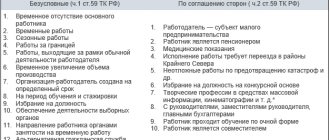Temporary contract
Any labor relations between employees and employers must be recorded. Their presence is generally confirmed by the contract, as well as an entry in the employment contract - in case of a fixed-term employment contract or an open-ended one. If the execution of this document accompanies the establishment of a specific period during which the employee must perform his labor functions, then such a contract is considered urgent.
This definition includes:
- seasonal work;
- temporary work;
- implementation of reconstruction;
- commissioning works;
- activities of persons holding elected positions;
- civilian alternative service.
Derivatives contracts are usually concluded in the presence of one or more factors:
- the need to replace a temporarily absent employee;
- inability to provide a workplace for an indefinite period due to the nature of the duties performed.
Also see “How to register a replacement during sick leave.” and “We draw up a fixed-term employment contract for the duration of maternity leave.”
Please note: the maximum period for a fixed-term contract cannot exceed 5 years. Otherwise, the contract is classified as open-ended.
Also see “Standard employment contract: who, why and when can conclude it.”
Differences between an employment contract and a GPC agreement
Both the employment contract and the civil process agreement are concluded for the purpose of formalizing relations for a citizen to perform any work for an enterprise, however, in the first case, special working relationships arise that are not regulated by the Civil Code. The differences between the two types of agreements are as follows:
- according to the GPC, certain work or task is performed, while according to the labor employee, he performs a labor function and holds a position in the company;
- in labor relations, a citizen is obliged to comply with internal regulations, other local regulations, as well as orders and instructions from management. When concluding a GPC agreement, the principle of equality of parties applies;
- the employer has certain obligations in labor relations: payment of wages to the employee at least twice a month, payment of contributions, organization of labor and safety, certification of workplaces, etc. The relations of the parties in the GPC agreement are regulated only by agreement of the parties and the law, internal legal documents do not apply to them, payment of remuneration can be carried out in any manner that does not contradict the law, as agreed upon by the parties; There are no insurance contributions.
A GPC agreement must be distinguished from a fixed-term employment contract. Most often, working relationships are formalized on an indefinite basis; a fixed-term contract is concluded only if it is impossible to conclude an open-ended one. The difference between fixed-term contracts and GPC is based on the constancy of the functions assigned to the employee: the GPC agreement is concluded not just for a certain period, but to perform a specific task.
Here is a table of preferred formulations.
| Employment contract | GPC agreement |
| Names of parties: employee - employer | Names of parties: customer - contractor |
| Indication of positions according to the staffing table, indication of function, for example legal adviser | Indication of specific work, for example filing a statement of claim |
| Indication of a permanent nature, such as a reference to job descriptions | Indication of quantitative indicators, for example drawing up two statements of claim |
| Link to PVTR, mandatory compliance | Lack of reference to rules or other local regulations |
| Indication of the location of the workplace | A citizen is not provided with a job |
| Logistics and personal protective equipment are provided by the employer | We use our own materials, equipment, and personal protective equipment. |
| Payment of wages at least 2 times a month | Payment of remuneration is carried out in accordance with the agreement of the parties in the contract (it is advisable that the schedule does not coincide in dates with the salary payment schedule at the enterprise) |
| It is allowed to be involved in overtime work or sent on a business trip | Phrases about overtime work and business trips are unacceptable, this is an element of labor relations |
Sample GPC agreement
Registration in the labor register for a fixed-term employment contract
When hiring a new employee, the employer becomes obligated to maintain a work record book. The only exceptions are part-time workers. Entries for them are made at will on the basis of a written application.
For all other employees, recording their work activities is mandatory. In this case, the nature of the work does not matter.
Also, as in the case of an open-ended working relationship, an entry in the conscript’s work book is made in the following order:
- Initially, an order for employment is issued. Enrollment in the labor force is made on its basis.
- The title of the title is the name of the employer.
- Enter the serial number of the entry (column 1). Moreover, the numbering must be continuous.
- Column 2 reflects the start date of work.
- Column 3 contains wording about the fact of hiring, indicating the position (according to the staffing table) and structural unit (if any).
- The details of the basis document are transferred to column 4. That is, they provide the number and date of the corresponding employment order.
Making an entry in the work book about hiring an employee under a fixed-term contract is no different from recording other labor relations. should not reflect additional information about the pre-agreed period of work under a fixed-term employment contract
Please also note: “Entries in work books do not need to be certified with a seal.”
Does STD have a probationary period?
Yes, the employer has the right to assign a probationary period to a temporary employee, however, there are some restrictions - the probationary period cannot be more than 2 weeks if the full term of the TD is from 2 to 6 months. In addition, Article 70 of the Labor Code introduced a ban on establishing a probationary period under the following circumstances:
- a temporary employee is hired for a period of less than 2 months;
- a pregnant woman or an employee with children under one and a half years old is registered;
- registration of minors;
- first hiring of a graduate of an educational institution;
- temporary elective position.
| Important! In all other cases of concluding an employment contract for a certain period, the rules for establishing tests for those hired are the same as for concluding open-ended contracts. |
Features of termination
Termination of a fixed-term employment contract has some features. Under certain circumstances, it can be automatically extended, thereby acquiring the status of an indefinite period. This happens in cases where neither party, upon expiration of the document, expressed a desire to terminate the employment relationship.
Termination of a fixed-term employment contract must be accompanied by a written warning from the employer to the employee about the termination of the contract. Notification must be submitted at least 3 days before the end of the period. An exception is performing work for an absent person.
Please note that in the absence of warning, dismissal must occur either with the consent of the employee or on a general basis.
The end of a fixed-term employment relationship may be as follows:
| Base | The moment of ending |
| Completion of work | Confirms the relevant document. For example, an act of completion. |
| Replacing another employee | His departure to work |
| End of period | In relation to seasonal work - the onset of a certain calendar date or climatic (temperature) minimum/maximum |
The termination of the employment relationship is also accompanied by making an entry in the employment record. In this case, the wording will sound like this:
| “The employment contract was terminated due to the expiration of the employment contract.” |
The entry made, as with other grounds for dismissal, is signed by the company’s personnel specialist and the owner of the work book. The document must be issued to the dismissed employee on the last working day.
This is what the entry in the employment contract should look like for a fixed-term employment contract :
But in some cases, a fixed-term contract can be terminated early. The most common reasons are:
- agreement of the parties;
- termination at the initiative of the employee or employer;
- transfer to another company;
- refusal to further perform work functions due to changed labor circumstances.
And in such situations, a fixed-term employment contract does not affect the entry in the work book in any way. That is, the wording will fully correspond to the real grounds for dismissal.
Also see “Rules for filling out and maintaining a work book.”
Read also
14.06.2018
How are labor relations formalized?
The employment contract must reflect the following information regarding the employee and the employer:
- full name and place of residence of the citizen;
- details of his identity document;
- bank account details for payment;
- name of legal entity, full name Individual entrepreneur or citizen - employer;
- the name of the person authorized to represent the interests of the employer;
- employer's address;
- his bank details.
A complete list can be found in Art. 57 Labor Code of the Russian Federation. These are the usual details of the contract, but in this case special attention must be paid to filling them out.
Fixed-term and unlimited-term contracts - what is the difference?
For ease of comparison, we present the data in table form:
| Index | Perpetual TD | Urgent TD |
| Validity | Has no expiration date | Maximum five years. The deadline can be indicated by a date or event (the departure of a permanent employee, the end of temporary work). In addition, it is added to the order |
| Reason for imprisonment | Not specified | Must be specified in the order |
| Worker task | The employer constantly assigns new tasks | The task is one-time and specific |
| Employee social guarantees | Provided for by the Labor Code (sick leave, vacation, etc.) | Similar to BTD, if at the time of the warranty period the STD has not yet expired |
| State attitude | It is perceived as a guarantee of stable income for the population and economic prosperity | A possible source of risk in the form of abuse by the employer. Maximum inspections by the Labor Inspectorate |
However, the employer cannot always freely choose what type of contract to offer the applicant, since in some points the law requires the conclusion of a STD, and in others it makes such a step on the part of the employer possible, but not mandatory.
Agreement for a specific period
When the conditions of the upcoming activity do not make it possible to formalize a working relationship for an indefinite period, a contract with a specified duration can be drawn up.
Reasons
The reasons that are defined by law for the execution of short-term contracts can be divided into two types:
- Unconditional (Part 1 of Article 59 of the Labor Code of the Russian Federation). These include, for example:
- Absence of key employee
- Seasonal work
- Temporary increase in production volume
- Period of study (internship)
- Applied by agreement of the parties (Part 2 of Article 59 of the Labor Code of the Russian Federation). For example, if:
- The employee receives a pension
- There are medical indications
- The employee is studying full-time
- There is a combination of jobs
Are there marks provided?
In accordance with Article 58 of the Labor Code of the Russian Federation, fixed-term employment contracts are concluded for a period of up to five years. The following provision of the code sets out the reasons why it can be issued. It is important that there is a real basis that does not allow concluding an open-ended contract.
Depending on the nature of the work and the personality of the employee, different periods are established by law. However, it must be at least two months. This period is prescribed mainly for seasonal work.
However, it is not practical for an employee to hire for such a short time, so records of hiring and dismissal are usually not made. Although Article 65 of the Labor Code provides that records are made upon application to the employee.
When a person is hired to fill a position, the period of work can reach several years. For example, the absence of a key employee due to pregnancy and child care sometimes reaches more than three years. In such cases, registration is already mandatory.
The situation is the same with specialists elected by competition for a term of up to five years. Here, keeping the book and making all the necessary records is required.
In accordance with generally accepted rules and regulations, appointment and removal from office are recorded:
- for seasonal work (less than three months) - at the initiative of the employee;
- when replacing during maternity leave - mandatory;
- when appointed as a result of a competition – also mandatory.
The procedure for making entries in the work book is insignificant compared to permanent employment. In this case, the employer must take into account both them and the special rules of Chapter 13 of the Labor Code of the Russian Federation.
In general, the appointment mark is absolutely identical. But the entry on the termination of the contract presupposes special grounds for termination of labor activity. All other provisions, for example, on awards, are unified and therefore do not imply any differentiation depending on the category of employee.
Responsibility of the employer for an employment contract without a work book
The article lists three cases where the possibility of concluding an employment contract without a book is legislated. In other cases, the employer must ensure that there is an entry in the book. Evasion of this obligation is punishable by law and faces certain consequences for the employer. This thesis is enshrined in Decree of the Government of the Russian Federation dated April 16, 2003 No. 225. In this regard, Article 5.27 of the Code of Administrative Offenses of the Russian Federation provides for fines for such an offense in the amount of 1,000 to 50,000 rubles. Repeated violation may result in a fine of 10,000 to 70,000 rubles, as well as disqualification of the manager. Moreover, payment of a fine does not relieve one from civil liability to the employee: obligations to properly formalize the relationship, payment of various compensations for the period of the relationship, etc.
Often, employers hide under civil law agreements relations that fall under the Labor Code of the Russian Federation. For example, concluding contracts for an author's order or for the performance of any services. Such violations may be discovered through an audit or as a result of a complaint received from employees. Inspectors are guided by the essence of the existing legal relations.
Often such cases go to court and are decided not in favor of the employer. This outcome is typical when inspectors come to the conclusion that the existing legal relationship between the customer and an individual is of a permanent nature and is subject to the Labor Code of the Russian Federation. Since when carrying out work under a GPC agreement, the employee is considered not to be socially protected, the court takes his side. In particular, the employee does not have the right to paid vacation and sick leave. The employer has no liability for compensation for damages in the event of a work injury, and pregnant women are not paid maternity leave. In addition, the contract can be terminated at any time. However, the employee does not receive notification of this in advance. Therefore, care should be taken in advance to ensure that employees are properly registered in order to avoid administrative liability and infringement of workers’ rights.
The article was prepared jointly with the United Consulting Group.









